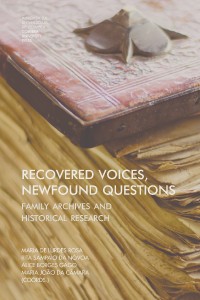Please use this identifier to cite or link to this item:
https://hdl.handle.net/10316.2/47886| DC Field | Value | Language |
|---|---|---|
| dc.contributor.author | Pereira, Zélia | |
| dc.date.accessioned | 2020-02-17T14:27:53Z | |
| dc.date.accessioned | 2020-08-27T16:44:32Z | - |
| dc.date.available | 2020-02-17T14:27:53Z | |
| dc.date.available | 2020-08-27T16:44:32Z | - |
| dc.date.issued | 2019 | - |
| dc.identifier.isbn | 978-989-26-1794-7 (PDF) | |
| dc.identifier.isbn | 978-989-26-1793-0 | |
| dc.identifier.uri | https://hdl.handle.net/10316.2/47886 | - |
| dc.description.abstract | In recent decades, several institutions have played a significant role in the preservation of personal archives, founded on their relevance to history, culture, and collective memory. Based on the results of a census carried out to identify memory institutions in Portugal and the personal archives they preserve, this article reflects on some aspects related to the role of these archival institutions in the construction of collective memory. Considerations are made on some archival practices that concern the appraisal and selection of records produced by individuals, and on the underlying policies for their safeguard for posterity that consider hierarchies of applied value, emphasizing the importance of certain documents, personalities, and social areas. Taking a closer look at the specific universe of personal archives that were preserved, the limits and implications of the processes of archival treatment are also questioned, namely their arrangement and description, exploring some levels of under-representation and how conscious decisions and historical influences have affected the final representation of individuals and of their archives. The global impact of the acts and decisions of memory institutions, individuals, families and other communities on archives is examined, along with its consequences for the correct understanding of what are personal archives and the definition of the underlying information systems, as well as the interpretation of the accumulation of information production contexts and its subsequent communication. | eng |
| dc.description.abstract | Nas últimas décadas, várias instituições têm desempenhado um papel significativo na preservação de arquivos pessoais, fundamentando-se na sua relevância para a história, cultura e memória coletiva. Com base nos resultados de um recenseamento que visou identificar, em Portugal, que instituições preservam arquivos pessoais, este artigo reflete sobre alguns aspetos relacionados com o seu papel na construção da memória coletiva. São tecidas considerações sobre algumas práticas arquivísticas relacionadas com a avaliação e seleção de documentos produzidos por indivíduos, e sobre as políticas subjacentes à sua salvaguarda para a posteridade, que levam em conta hierarquias de valor, enfatizando a importância de determinados documentos, personalidades e áreas sociais. Examinando mais de perto o universo específico dos arquivos pessoais que foram preservados, também se questionam os limites e implicações dos processos de tratamento arquivístico, nomeadamente a sua organização e descrição, explorando-se alguns níveis de subrepresentação e a forma como decisões conscientes e influências históricas afetaram a representação final dos indivíduos e dos seus arquivos. Aborda-se o impacto global dos atos e decisões de instituições de memória, indivíduos, famílias e outras comunidades na formação dos arquivos, e as consequências daí decorrentes para a correta compreensão do que é um arquivo pessoal e dos sistemas de informação inerentes, bem como para a interpretação dos contextos de produção e acumulação de informação e sua posterior comunicação. | por |
| dc.language.iso | eng | - |
| dc.publisher | Imprensa da Universidade de Coimbra | por |
| dc.rights | open access | - |
| dc.subject | personal archives | eng |
| dc.subject | memory institutions | eng |
| dc.subject | collective memory | eng |
| dc.subject | appraisal | eng |
| dc.subject | archival census | eng |
| dc.subject | arquivos pessoais | por |
| dc.subject | instituições de memória | por |
| dc.subject | memória coletiva | por |
| dc.subject | avaliação | por |
| dc.title | Personal archives and the shaping of collective memory in Portugal: results of a national census | por |
| dc.type | bookPart | por |
| uc.publication.firstPage | 141 | - |
| uc.publication.lastPage | 162 | - |
| uc.publication.location | Coimbra | por |
| dc.identifier.doi | h10.14195/978-989-26-1794-7_8 | - |
| uc.publication.section | Recovering, reconstructing and (re)discovering family and personal archives | por |
| uc.publication.digCollection | PB | por |
| uc.publication.orderno | 9 | - |
| uc.publication.area | Artes e humandidades | por |
| uc.publication.bookTitle | Recovered voices, newfound questions: family archives and historical research | - |
| uc.publication.manifest | https://dl.uc.pt/json/iiif/10316.2/47886/198188/manifest?manifest=/json/iiif/10316.2/47886/198188/manifest | - |
| uc.publication.thumbnail | https://dl.uc.pt/retrieve/10965629 | - |
| uc.publication.parentItemId | 56749 | - |
| uc.itemId | 67632 | - |
| item.grantfulltext | open | - |
| item.fulltext | With Fulltext | - |
| Appears in Collections: | Recovered voices, newfound questions: family archives and historical research | |
Files in This Item:
| File | Description | Size | Format | |
|---|---|---|---|---|
| personal_archives_and_the_shaping_of_collective_memory.pdf | 750.36 kB | Adobe PDF |  |
Items in DSpace are protected by copyright, with all rights reserved, unless otherwise indicated.
